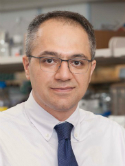Immunogenicity and therapeutic targeting of a public neoantigen derived from mutated PIK3CA Journal Article
| Authors: | Chandran, S. S.; Ma, J.; Klatt, M. G.; Dündar, F.; Bandlamudi, C.; Razavi, P.; Wen, H. Y.; Weigelt, B.; Zumbo, P.; Fu, S. N.; Banks, L. B.; Yi, F.; Vercher, E.; Etxeberria, I.; Bestman, W. D.; Da Cruz Paula, A.; Aricescu, I. S.; Drilon, A.; Betel, D.; Scheinberg, D. A.; Baker, B. M.; Klebanoff, C. A. |
| Article Title: | Immunogenicity and therapeutic targeting of a public neoantigen derived from mutated PIK3CA |
| Abstract: | Public neoantigens (NeoAgs) represent an elite class of shared cancer-specific epitopes derived from recurrently mutated driver genes. Here we describe a high-throughput platform combining single-cell transcriptomic and T cell receptor (TCR) sequencing to establish whether mutant PIK3CA, among the most frequently genomically altered driver oncogenes, generates an immunogenic public NeoAg. Using this strategy, we developed a panel of TCRs that recognize an endogenously processed neopeptide encompassing a common PIK3CA hotspot mutation restricted by the prevalent human leukocyte antigen (HLA)-A*03:01 allele. Mechanistically, immunogenicity to this public NeoAg arises from enhanced neopeptide/HLA complex stability caused by a preferred HLA anchor substitution. Structural studies indicated that the HLA-bound neopeptide presents a comparatively 'featureless' surface dominated by the peptide's backbone. To bind this epitope with high specificity and affinity, we discovered that a lead TCR clinical candidate engages the neopeptide through an extended interface facilitated by an unusually long CDR3 beta loop. In patients with diverse malignancies, we observed NeoAg clonal conservation and spontaneous immunogenicity to the neoepitope. Finally, adoptive transfer of TCR-engineered T cells led to tumor regression in vivo in mice bearing PIK3CA-mutant tumors but not wild-type PIK3CA tumors. Together, these findings establish the immunogenicity and therapeutic potential of a mutant PIK3CA-derived public NeoAg. A new high-throughput platform to find rare T cells that can recognize shared cancer neoantigens identifies T cell receptors specific for a conserved, immunogenic and therapeutically actionable epitope in mutant PI3K alpha, one of the most common driver oncogenes |
| Keywords: | gene; peptide; antigen; binding; t-cells; complex; antitumor-activity; somatic mutations; cancer; human; pd-1 blockade |
| Journal Title: | Nature Medicine |
| Volume: | 28 |
| Issue: | 5 |
| ISSN: | 1078-8956 |
| Publisher: | Nature Publishing Group |
| Date Published: | 2022-05-01 |
| Start Page: | 946 |
| End Page: | 957 |
| Language: | English |
| ACCESSION: | WOS:000788453200002 |
| DOI: | 10.1038/s41591-022-01786-3 |
| PROVIDER: | wos |
| PMCID: | PMC9117146 |
| PUBMED: | 35484264 |
| Notes: | Article -- Source: Wos |
Altmetric
Citation Impact
BMJ Impact Analytics
MSK Authors
-
 309
309Wen -
 502
502Scheinberg -
 639
639Drilon -
 646
646Weigelt -
 184
184Razavi -
 148
148Da Cruz Paula -
 60
60Klebanoff -
 17
17Chandran -
 82
82Bandlamudi -
 22
22Klatt -
 14
14Banks -
 4
4Yi -
 1
1Fu -
 1
1Vercher -
 10
10Etxeberria -
 1
1Bestman -
 4
4Aricescu
Related MSK Work



